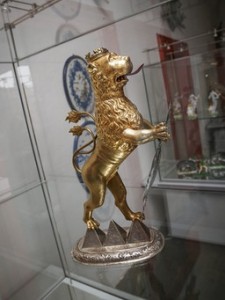Restitution policy at the federal and state level in Germany in recent months seems to have taken a certain direction that has been cause for criticism. Whether it is the recent decisions by the Limbach Commission that ignore longstanding law about sales under duress, the odd decision by the Federal Republic of Germany to resist a lawsuit over the Max Liebermann painting found in Cornelius Gurlitt’s apartment that the Gurlitt Task Force has already recommended be restituted, or the resistance to the claims by the Mendelssohn-Bartholdy heirs to Picasso’s Madame Soler, the trend has been towards obstruction and resistance rather than transparency and reconciliation. Notwithstanding the recent announcement of the Center for Cultural Property losses (the Deutsches Zentrum für Kulturgutverluste about which the jury is still out), this is cause for concern.
Museums in Bamberg and Karlsruhe Recognize a Sale Under Duress For What it Was, Seek to Do Right Thing
Topics: Katharina Siefert, Schwabinger Kunstfund, Cornelius Gurlitt, Karlsruhe Kunsthalle, Freien Kunst- und Ritterschießen, Badische Landesmuseum, Max Liebermann, Bamberg, Gurlitt Collection, Woman in a Theatre Balcony, Lothar Franz von Schönborn, Madame Soler, Schönborn’sche Löwenpokal, Heinrich and Emma Budge, Reich Ministry for Art- and Museum Objects, Schönborn Lion Cup, Restitution, Upper Franconia, Mendelssohn-Bartholdy, Mannheim, Karlsruhe, Free and Knightly Art of Shooting, World War II, Elector-Bishop, Kurfürst, Reichserziehungsministerium für Kunst- und Museums, Kurt Martin, www.lostart.de, Center for Cultural Property, Museums, Fürst-Bischof, Picasso, Federal Republic of Germany, Deutsches Zentrum für Kulturgutverluste, Limbach Commission, Oberfranken, Prince-Elector of Mainz
Claims by Mendelssohn Bartholdy Heirs over Picasso "Madame Soler" Dismissed, Court Finds No FSIA Jurisdiction After Evidentiary Hearings
The U.S. District Court for the Southern District of New York has dismissed claims for ownership of Madame Soler by Pablo Picasso, currently at the Pinakothek der Moderne in Munich. Just as the relevance of Judge Jed Rakoff’s comments over another art restitution case brought by the heirs of Paul von Mendelssohn Bartholdy unexpectedly came to the fore recently, Judge Rakoff’s decision is now the most recent in a line of frustrations for the heirs of Mendelssohn Bartholdy, a victim of Nazi persecution in Berlin in the 1930s. The ramifications of this case may be fairly narrow, however, as the case was premised on allegations of specific transactions in New York rather than general allegations about the conduct of Germany. The claimants could appeal, or perhaps turn to the Limbach Commission if they could be heard (the Pinakothek is a subdivision of Germany for jurisdictional analysis, but it’s unclear at first blush if the Commission would view this claim as within its province).
Topics: Paul von Mendelssohn Bartholdy, Berlin, commercial activity exception, Cornelius Gurlitt, Florence Kesselstatt, Judge Jed Rakoff, Halldor Soehner, Saint-Jean-Cap-Ferrat, Julius Schoeps, Upper East Side, Prussia, Max Liebermann, Night Café, Gurlitt Collection, Foreign Sovereign Immunities Act, Preussen, France, State Paintings Collection, Madame Soler, Museum of Modern Art, Edelgard von Lavergne-Peguilhen, Van Gogh, Munich, Justin K. Thannhauser, FSIA, expropriation exception”, Nazi persecution, Boy Leading a Horse, Restitution, David Toren, Bayerische Staatsgemäldesammlung, Bavarian State Ministry for Education and Culture, Free State of Bavaria, World War II, Foreign Sovereign Immunities, Pinakothek der Moderne, Bayerisches Staatsministerium für Bildung und Kult, Bundesländer, Altmann v. Republic of Austria, Freistaat Bayern, Le Moulin de la Galette, Kurt Martin, München, Pablo Picasso, Federal Republic of Germany, Limbach Commission, Wissenschaft und Kunst



